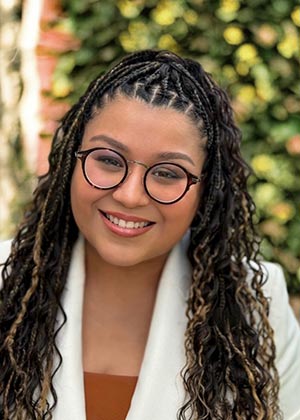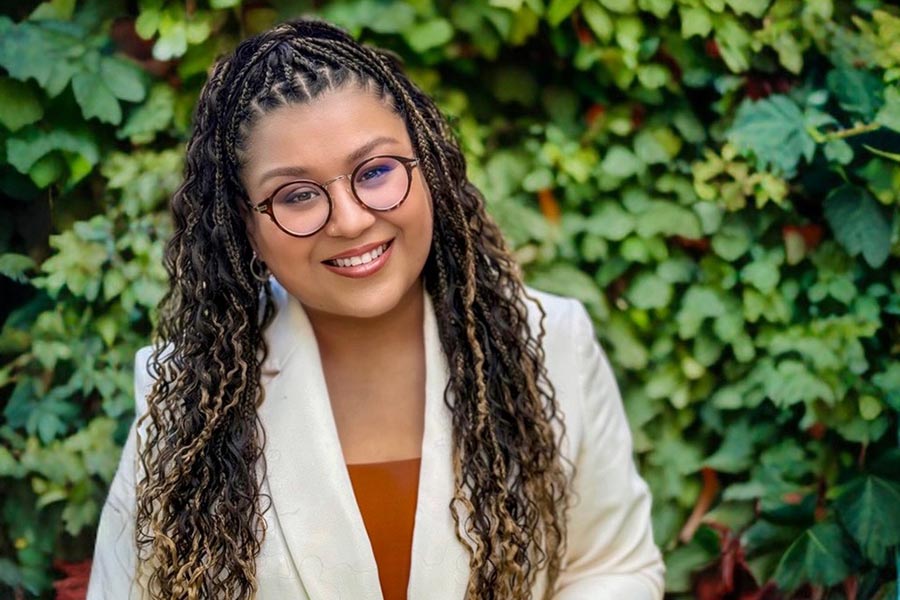OT grad draws on personal experience to fuel research

April 25, 2025 – DENTON – Defending your dissertation can feel like crossing the finish line of a marathon after years of training. You feel a sense of accomplishment but you also want to lay down and have a long, well-deserved nap.
Vanessa Yanez, a prior PhD candidate who successfully defended her dissertation in the School of Occupational Therapy at TWU Houston, had those mixed emotions after presenting her research. She also felt inspired and motivated to keep going.
One of her first steps is to disseminate her research, which explores the psychosocial experiences of adolescent and young adult cancer survivors (AYA) in early survivorship through an occupational lens.
“I don't want to keep this hidden in my desktop,” Yanez said. “I think there is really valuable information for clinicians to have in their pocket.”
A grant from the American Occupational Therapy Foundation will help ensure that her research reaches the people who need it most. Yanez is a recipient of the Bonita Kraft Occupational Therapy Doctoral Student Scholarship, which supports research in mental health and severe mental illness.
With the award, Yanez plans on publishing her research as open access, which is an additional cost. A veteran presenter, Yanez attends three to four conferences a year, and each one can cost several thousand dollars. This investment isn't just professional development to Yanez, it’s a form of advocacy, a way to make knowledge more accessible to both clinicians and cancer survivors.
“It costs a lot of money to go and share this information and make those connections,” Yanez said.
Yanez’s research is vital to filling a gap in OT research on mental health issues of cancer survivors among young people. It is also near and dear to Yanez.
“As a cancer survivor and someone who works exclusively in oncology, I see firsthand how the post-treatment phase, especially for adolescent and young adult survivors, is often overlooked,” Yanez said. “Most of the focus, funding and research continues to center on treatment, while the long-term psychosocial needs of survivors are still not getting the attention they deserve.”
A cancer survivor is defined as anyone who has ever been diagnosed with cancer no matter where they are in the course of their disease.

“There are limited resources so a lot of it is spent just trying to survive,” Yanez added. “But what happens when someone does survive and they are trying to move on with their lives and they are still carrying on all their scars and side effects from the cancer treatment?”
As an occupational therapist who specializes in cancer care at City of Hope National Medical Center in California, Yanez looks to understand and treat what is impairing a patient’s ability to function and participate in life.
In the last few years, she started seeing younger and younger patients. These survivors in their 20s and 30s would tell her stories about not being able to focus in school, being overcome with tiredness or pain.
“I started to see these things over and over,” Yanez commented. “Young people not being able to go back to this life that they want or they previously had.”
Yanez found little research to support her patients, and felt challenged to fill that void in research herself, from the OT lens.
For her research, Yanez interviewed young cancer survivors one on one and later brought everyone together for a focus group. In general, cancer rehabilitation focuses on the physical impairments, and Yanez wanted to examine the psychosocial; the potential changes to thoughts, feelings, cognition, connection, spirituality and identity, and how they impact or disrupt daily life.
“If we don’t address the thoughts and minds and the beliefs, sometimes, we can’t even resolve the physical issues,” Yanez said.
Yanez chose Texas Woman’s OT PhD program because of its faculty expertise in oncology. She also had a special connection with professor Patricia Bowyer, who she met at a workshop.
“She really helped me understand how I can use theory to have a holistic approach with patients,” Yanez said. “That completely changed how I worked as a clinician, making me grounded in the use of meaningful occupations as a powerful tool for addressing not just physical challenges, but also the emotional, cognitive and identity-based struggles that survivors face.”
With all the data she collected, Yanez believes she can publish three or four articles.
“My dream, my wish, is to raise awareness about the full scope of what oncology occupational therapy can offer cancer survivors,” Yanez said. “I truly believe we’ve only scratched the surface — there is so much more we’re capable of doing to support people beyond treatment and into meaningful, empowered lives.”
Texas Woman’s School of Occupational Therapy offers two graduate occupational therapy programs. The entry-level graduate degree (OTD) is face-to-face, and the post-professional doctorate (PhD) is a hybrid program, primarily online with periodic seminars on campus. TWU Houston, a member of the Texas Medical Center, offers the OTD and PhD programs.
U.S. News & World Report recognized TWU’s occupational therapy program as being among the nation’s best and tops in Texas. OT ranked No. 1 in Texas, tied for 24th nationally and 15 spots in front of any other Texas program in the publication’s 2025 “Best Graduate Schools” edition, which offers rankings in a variety of categories.
Media Contact
Amy Ruggini
Digital Content Manager
940-898-3628
aruggini@twu.edu
Page last updated 4:10 PM, April 25, 2025